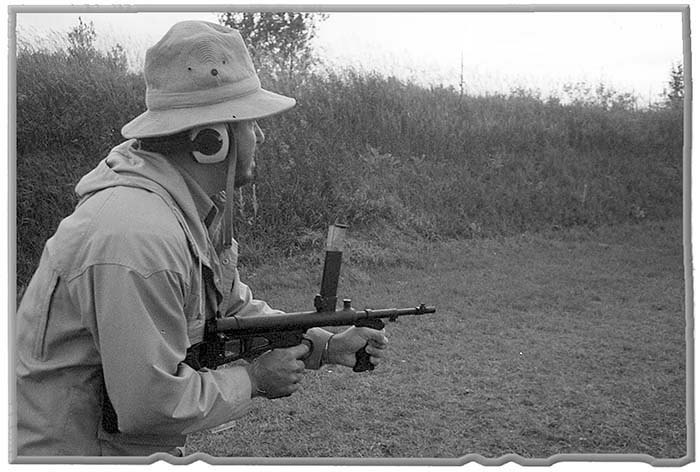By Finn Nielsen
When World War II broke out in September 1939 for The British Commonwealth, most of the member countries were totally unprepared for the conflict.
Equipment was still of World War I vintage, especially small arms. One country, Australia, had few up to date weapons. One woeful shortcoming was the absence of sub machineguns. Most of the coming fighting would be in terrain which would be ideally suited to this type of weapons’ short range firepower.
The idea of purchases from abroad was dropped immediately. Nothing was available, with the exception of a limited number of Thompson Guns used in the North African campaigns. Australians had to rely on their own resources.
The first submachine gun was the Mark I Austen. This design relied on the features of two proven designs, the MP 40 and the Sten Gun. Both excellent designs in their own right, with the exception of their egregious single row feed magazine designs.
Although the Australians had encountered the Beretta Modelo 38 in the desert, there were no efforts made to copy this fine sub machineguns’ magazine design.
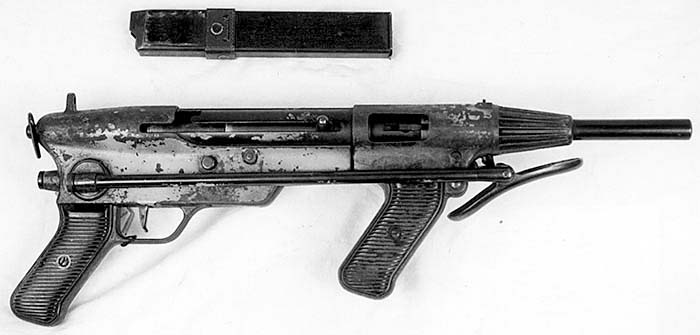
The Austen used the receiver and magazine housing of the Sten and the internal parts were pure MP 40, notably the telescoping return spring whose dirt proof design increased the reliability immensely. The folding stock was also MP-40. Those of you who have handled the Austen will note that the stock is longer than an MP- 40 which makes it a little nicer to handle on deliberate semi-auto fire from the shoulder if you are six one and overweight like myself. It’s probably too long for shorter shooters. The reason for the length was to enable it to fold under the forward pistol grip. The purely Australian feature is the two pistol grips. Well slanted back, they are ergonomically pleasing and do resemble MP-40 pistol grips, in fact the panels may interchange! Available literature indicates that only about 20,000 were made during the period 1942 – 1945.
The system of operation is of course blow back and it fires from an open bolt. Rate of fire was normal for the type, about 500 – 550 rounds per minute. Easily controllable for single shots, as well as bursts, by the experienced user, it did have a Sten type push through selector though.
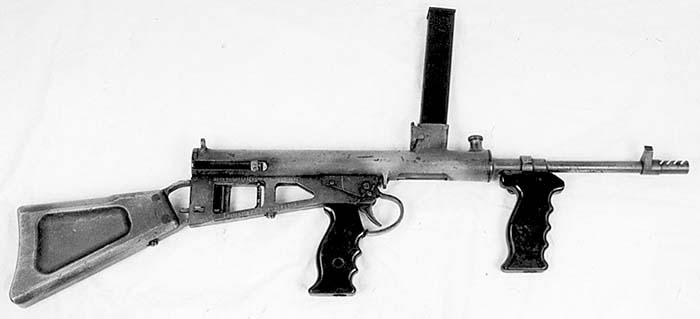
The next Australian development is one which is much better known than the Austen (The name is an acronym formed by AUS and STEN, Australian Sten) and this one was named after its designer Lt. E.E. Owen. This design did not exhibit any plagiarism of existing designs, other than firing from an open bolt. The rest of the features were Lt. Owen’s own brainchild. The most readily noticeable feature was the top mounted magazine (just as on the Villar-Perosa) It held 33 cartridges, 9mm Parabellum of course just as the Austen, and was of the lovely easy-to-load double row feed type. The most interesting feature of the magazine is that each magazine has the ejector as an integral part of its box. At the rear of the magazine a small square stub protrudes downward. The base of the cartridge case strikes this protrusion when it is pulled out of the chamber by the extractor and is hurled downward through the ejection port. The Owen is probably the only sub machinegun with this interesting design feature.
The bolt system of the Owen is completely enclosed and prevents the ingress of unwanted dirt. It is this feature which caused its almost legendary reliability during savage fighting in some of the most inhospitable jungle territory on earth.
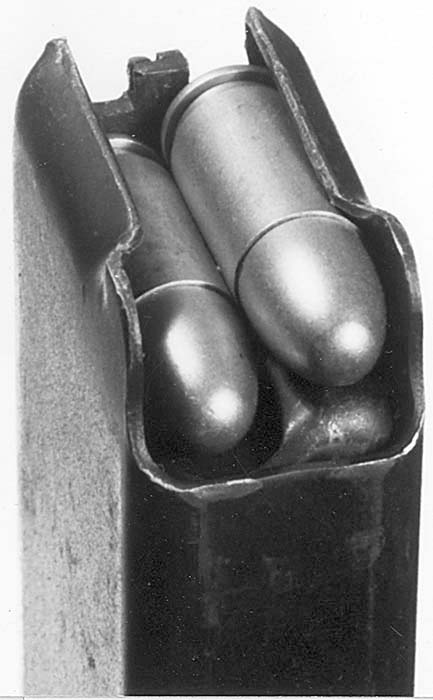
Because the magazine is mounted directly in the line of sight the peep rear sight is off set, as is the front sight, a la the Bren Gun. As with the Bren this is not a problem. Another advantage of the top mounted magazine is that at close range while firing instinctively it can be used as a rough sight. Some jokes have been made to the effect that because Australia is down under the force of gravity will aid the cartridge advance!
The selector is mounted on the left directly above your thumb (if you are a right handed shooter) all the way back is SAFE, center position is SEMI and all the way forward is FULL AUTO. The rate of fire is a little higher than the Austen at about 600 rpm.
The weight of the weapon, its good balance and the two pistol grips make it eminently controllable and a lot of fun to shoot. The magazine release is paddle-like directly behind the mag so there is no fumbling if you are changing them in the dark while terrified! (well, not much)
I obtained an Owen Gun from The Australian Government some years ago when such a thing was not unthinkable, and is probably impossible to-day. It came with seven magazines, a magazine brush, square to fit the mags and a knife bayonet. Post war the Owens were modified in this manner, the finish was a dark Parkerizing and the buttstock was wood. The barrel also had compensatory slots at the muzzle in addition to the bayonet lug..
I believe that bayonet would probably also fit the Australian version of the FAL, but never did try it. Many of the Owen Guns used in WW 2 were painted with gaudy colour schemes to fit them into the environment they were used in. Another feature of this fine gun was the quick release barrel. Probably not intended for quickchange replacement with a cool one, it did make transport in my brief case practicable, as the buttstock also removed with a pressure on its retaining lever.
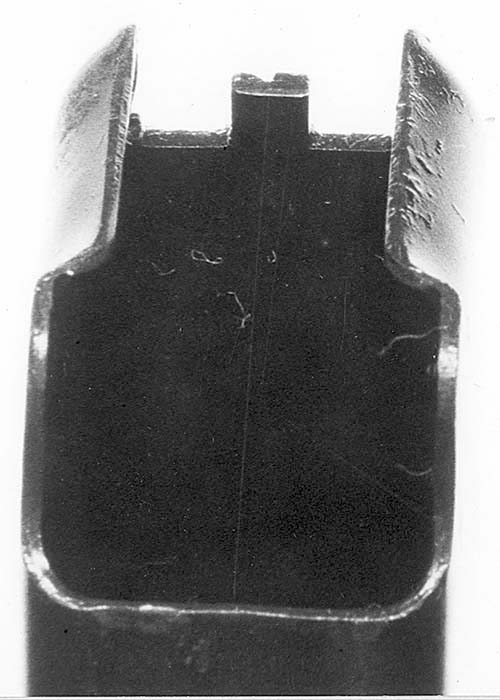
I never had a stoppage with my Owen, it wasn’t pretty, but it always worked.
They were in use for many years following the Second War, notably in the vicious Malayan conflict against the communists. This campaign was one of the few successful repressions of these agrarian reformers, and the Owen was the weapon of choice, if it could be gotten. They were also present in Viet-Nam with the Australian contingent who were no doubt bemused to be using the sub machinegun their fathers had talked of. Certainly it performed then as it always did, just great!
The passage of time dictated that superior designs were in the offing, and the Owen faded away into long term ‘emergency storage’, the fate of many fine weapons.
The next sub machinegun on the scene was the F1. Still in 9mm Parabellum and blow back operated it retained the top mounted magazine feature of the Owen. This time that magazine was the lovely Sterling design and that magazine will of course interchange with all the other Sterling magazines, even the Canadian simplified design without the rollers.34 round capacity, it is a proven design still in use to-day. The F1 itself looks
Like a marriage between a Sterling sub machinegun and an L1A1 rifle. It has the barrel jacket of the Sterling wedded to the pistol grip assembly of the L1A1.
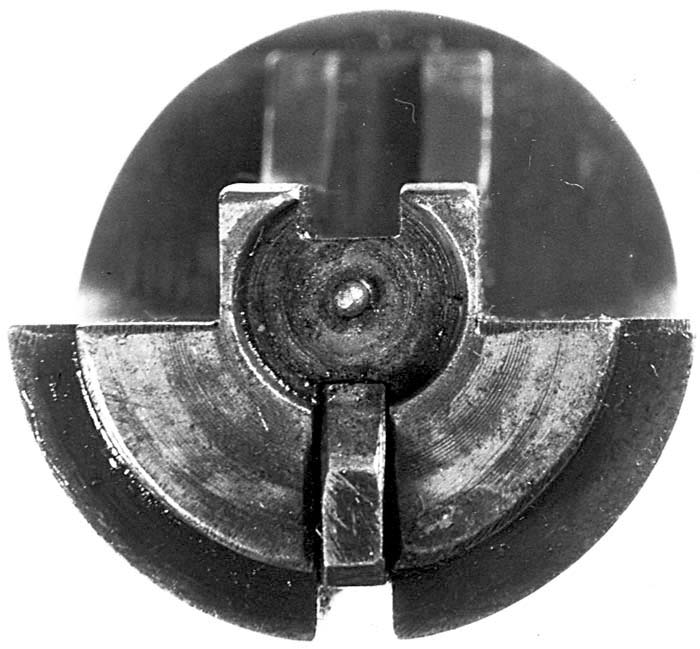
This simplifies training somewhat. During my military adventure the training with the FAL (or C1A1 or SLR) emphasized that all movements such as cocking and loading the rifle, applying the safety and mounting or removing the magazines must be done with the left hand. Thus control is maintained of the weapon. So the next time you change the safety on your FAL with the right thumb there is some Guards Regiment Corporal/Instructor ready to give you some new names and he may speak harshly of your beloved parents. Been there, done it, no T-shirt. Use the left hand, there was a good reason for it.
The one feature I did not like was the folding sheet metal rear sight, When not in use it folds down on both sides of the receiver, but when raised is vulnerable and prone to damage. In addition, there is no fire selector, a light pressure on the trigger (after it has been moved down from the safe position with the left thumb) causes single shots, heavier pressure, bursts. No problem.
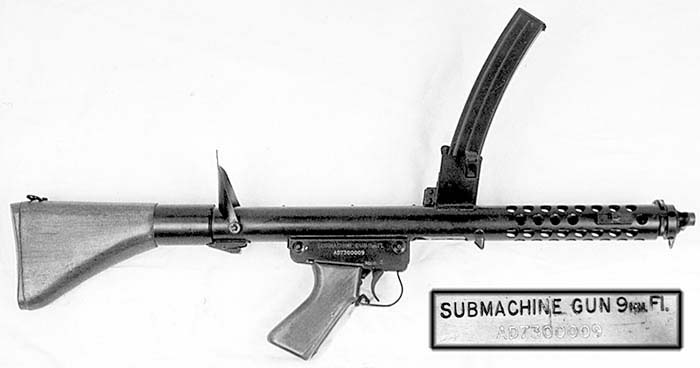
While not as charismatic or historical as its predecessors, the F1 is a fine design as well. They have probably mostly been relegated to the same resting places as the earlier guns and have now been replaced by the AustAug, which fills all the functions of sub machinegun and rifle for the current Australian Forces.
We are but custodians, and I am glad I had the opportunity to own and shoot them.
| This article first appeared in Small Arms Review V3N10 (July 2000) |



